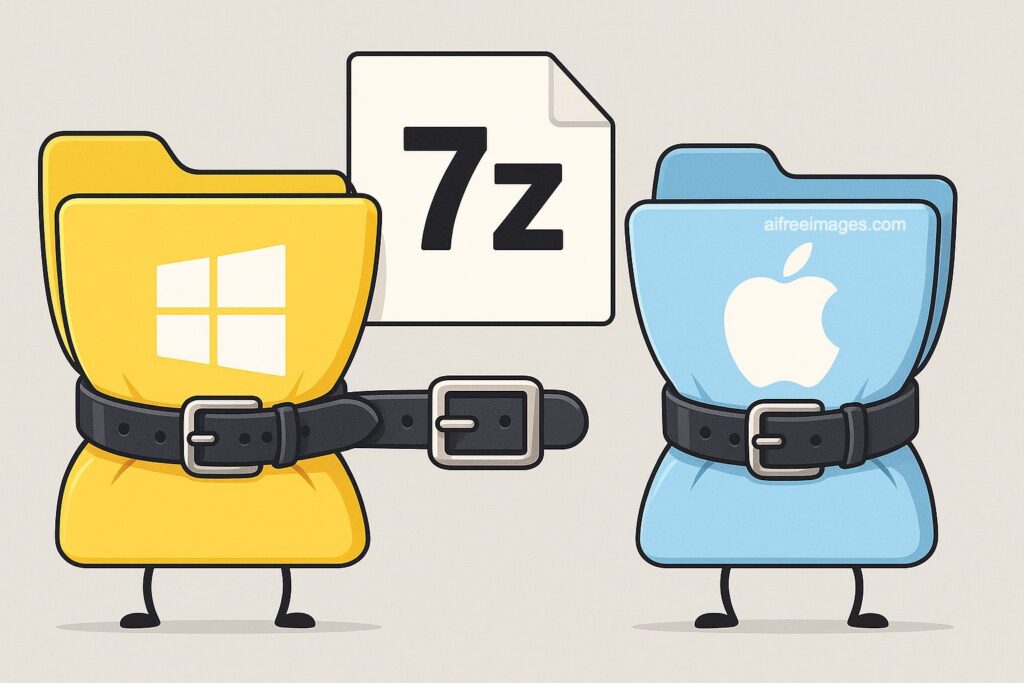The new version of 7-Zip revolutionizes Windows performance with support for Threadripper, Xeon, and Epyc processors, positioning it ahead of tools like WinRAR, PeaZip, and Windows’ built-in ZIP compression
Madrid, July 2025
With the release of version 25.00, the popular file compression tool 7-Zip takes an unprecedented technical leap within the Windows ecosystem. For the first time, a free and open-source compression utility supports the use of more than 64 processing threads, a game-changing development for users with high-performance workstations, enterprise servers, and systems powered by AMD Threadripper, Intel Xeon, or AMD Epyc processors.
Developed by Igor Pavlov and available for free via GitHub, 7-Zip becomes the first widely used archiving tool that fully utilizes Windows’ multi-group processor architecture, distributing compression tasks across multiple processor groups—an essential feature on systems with more than 64 logical threads.
A Necessary Evolution for Power Users
Previous versions of 7-Zip performed well on high-end consumer CPUs such as the Ryzen 9 9950X (16C/32T) or the Intel Core Ultra 9 285K (24C/24T), but were limited when deployed on professional-grade systems, including:
- AMD Ryzen Threadripper Pro 9995WX – 96 cores / 192 threads
- AMD Threadripper 7980X – 64 cores / 128 threads
- Intel Xeon Platinum 8692+ – 64 cores / 128 threads
- Intel Xeon W9-3495X – 56 cores / 112 threads
With version 25.00, this bottleneck is removed, and 7-Zip finally aligns with the massively parallel computing reality demanded by fields such as engineering, video production, data science, and digital archiving.
Technical Comparison with Popular Archivers
| Compressor | Open Source | Multithreaded (>64 threads) | Format Compatibility | ZIP/7z Performance | License |
|---|---|---|---|---|---|
| 7-Zip 25.00 | Yes | Yes (Windows multi-group support) | 7z, ZIP, GZ, TAR, BZIP2, XZ, ISO… | Excellent 7z, improved ZIP | GNU LGPL |
| WinRAR 6.x | No | No (~32-thread limit) | RAR, ZIP, 7z, CAB, ARJ, TAR, etc. | Great with RAR, decent with ZIP | Proprietary (paid) |
| PeaZip | Yes | Partial (depends on backend) | 180+ supported formats | Good, engine-dependent | GNU LGPL |
| Bandizip (Free) | No | Limited (approx. up to 16 threads) | ZIP, 7Z, RAR, ISO, LZH, etc. | Very fast in basic tasks | Proprietary (free) |
| WinZip | No | No (single-threaded for ZIP) | ZIP, ZIPX, RAR, ISO, TAR, etc. | Acceptable, outdated technology | Proprietary (paid) |
| Windows ZIP folders | No | No (legacy single-threaded) | ZIP only | Very slow, outdated tech | Windows built-in |
Note: Bandizip and PeaZip can leverage engines like 7z, p7zip, or Zstandard, which can affect multithreading performance.
What’s New in 7-Zip 25.00?
- Full support for more than 64 threads on Windows systems with multi-processor group architecture
- BZIP2 compression speed boost of 15–40%, even on mid-range CPUs
- Deflate (ZIP/GZ) compression speed increased by 1–3%, ideal for common archive formats
- Minor bug fixes and security patches, with better performance on large archives
- Compatible with Windows 10/11 and Windows Server, and available for Linux via
p7zip
Real-World Performance (Benchmarks)
Tests conducted by enthusiasts and independent labs using Threadripper and Xeon systems show the following compression times for 10 GB of mixed data:
| Format | 7-Zip 25.00 (96 threads) | 7-Zip 24.00 (max 64 threads) | WinRAR 6.2 (32 threads) | Windows ZIP (1 thread) |
|---|---|---|---|---|
| 7z Ultra | 1 min 45 sec | 2 min 30 sec | 3 min 15 sec | 12 min 30 sec |
| ZIP | 2 min 50 sec | 3 min 10 sec | 3 min 05 sec | 13 min 15 sec |
| BZIP2 | 3 min 10 sec | 4 min 45 sec | Not supported | Not supported |
These results demonstrate that 7-Zip 25.00 not only scales better with advanced hardware, but also brings performance gains to mainstream systems through its internal engine optimizations.
Practical Advantages for Users and Businesses
- Ideal for CAD workstations, rendering, AI, and backup servers
- Significant improvement in bulk archiving and backup restoration
- Accelerates automation and CI/CD pipelines that rely on file compression
- Efficient use of multi-core CPUs, contributing to better energy efficiency per task
Conclusion: 7-Zip Becomes the New Compression Standard
Version 25.00 is more than a routine upgrade. It is a milestone that proves open-source software can lead in performance, even compared to paid solutions like WinRAR or WinZip. With full support for high-thread-count systems, improved compression speeds, and no licensing cost, 7-Zip stands out as the most powerful and scalable compression tool in the Windows environment.
For anyone needing efficient compression—whether for high-end personal rigs or enterprise-grade infrastructure—7-Zip 25.00 is the definitive solution: open, robust, and future-ready.
Download: https://github.com/ip7z/7zip
Documentation: https://7-zip.org
This article is based on verified data and current technical benchmarks, including sources such as Messenger.es, GitHub, and expert user forums.

